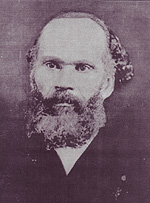
Abraham Doras Shadd (March 2, 1801 – February 11, 1882) was an African-American abolitionist and civil rights activist who emigrated to Ontario, Canada, and became one of Canada's first black elected officials. He was the father of prominent activist and publisher Mary Ann Shadd and her siblings Eunice P. Shadd and Isaac Shadd.
Early life
Abraham Shadd was born on March 2, 1801, to Jeremiah Schad and Amelia Siscoe. Jeremiah Schad was a son of Hans Schad, alias John Shadd, a native of Hesse-Cassel who had entered the United States serving as a Hessian soldier with the British Army during the French and Indian War. Hans Schad was wounded and left in the care of two African-American women, mother and daughter, both named Elizabeth Jackson. The Hessian soldier and the daughter were married in January 1756 and their first son was born six months later. Sources dispute whether Abraham was born in Pennsylvania and moved to Delaware, or was born in Delaware. Abraham spent most of his early life in Wilmington, Delaware, eventually taking over the shoe-making shop his father Jeremiah had created.
Personal life
Shadd married Harriet Parnell in the early 1820s and together in 1823 had their first of thirteen children, Mary Ann Shadd. She and her siblings would be raised Catholic.
Civil rights and abolitionist movements
By the 1830s, Abraham Shadd started to become more prominent in the abolitionist movement. He used both his homes in West Chester, Pennsylvania, and Wilmington, Delaware, to provide lodging for fugitive slaves fleeing southern states. He was a prominent voice in the anti-colonization movement. Shadd was one of five black men at the founding of the Board of Managers of the American Anti-Slavery Society in 1833, as well as a prominent member of the Colored Conventions Movement, serving as a leading delegate in both the 1841 and 1848 black national conventions, both held in Philadelphia.
Life in Canada
While being a vocal critic of black colonization for most of his life, Abraham Shadd was prompted to move his family north to Canada West (Ontario, Canada) with the passing of the Fugitive Slave Act of 1850. Less than a decade later he would become one of the first black elected officials in Canada, being elected in 1859 to a seat on the Raleigh Township Council. Shadd became a very prominent member of his new Canadian community, creating a school within the Raleigh Township, as well as creating a loan system with his farm tools and equipment, in order to assist other farmers in the community. He also was a member and early trustee of the Prince Hall Masonic Lodge, which assisted former black slaves and freed men in their immigration to Canada West.
Death
Shadd died on February 11, 1882, a very prominent and well-known man within Canada West and the abolitionist and civil rights movements of the 1800s. His prominence fostered a large funeral ceremony attended at Maple Leaf Cemetery by residents of Kent County, where he would be buried.
Legacy
In February 2009, Shadd was commemorated with a stamp by Canada Post.
References
- Snodgrass, Mary Ellen (March 26, 2015). The Underground Railroad: An Encyclopedia of People, Places, and Operations. Routledge. p. 480. ISBN 9781317454168.
- Alexander, Leslie M.; Rucker, Walter C. Jr. (2010-02-09). Encyclopedia of African American History [3 volumes]. ABC-CLIO. pp. 525–526. ISBN 9781851097746.
- "Shadd, Abraham Doras (1801-1882) | The Black Past: Remembered and Reclaimed". blackpast.org. 24 February 2009. Retrieved November 26, 2018.
- Scott, P. (July 1, 2010). "Abraham Doras Shadd". The Mill Creek Hundred History Blog. Retrieved May 1, 2019.
- ^ The Black abolitionist papers. Ripley, C. Peter, 1941–. Chapel Hill: University of North Carolina Press. 1985–1992. ISBN 0807816256. OCLC 10924134.
{{cite book}}: CS1 maint: others (link) - ^ Rhodes, Jane (1998). Mary Anne Shadd Cary: The Black Press and Protest in the Nineteenth Century. Bloomington, Indiana: Indiana University Press. p. 4.
- Rhodes (1998). Mary Anne Shadd Cary: The Black Press and Protest in the Nineteenth Century. p. 79.
- ^ "Shadd, Abraham D. (1801–1892)". Municipality of Chatham-Kent. 20 November 2017. Archived from the original on 19 December 2018. Retrieved November 28, 2018.
- Hepburn, Sharon A. Roger (2007). Crossing the border : a free Black community in Canada. Urbana: University of Illinois Press. ISBN 9780252031830. OCLC 85622776.
- "Abraham Doras Shadd & Rosemary Brown". Canada Post. February 2, 2009. Retrieved February 9, 2019.
External links
- Chatham-Kent. Shadd, Abraham D. (1801–1882) Archived 2018-12-19 at the Wayback Machine. Chatham-kent.ca. Retrieved November 28, 2018.
- Ito, Gail Arlene. "Shadd, Abraham Doras (1801–1882)". Blackpast.org. Retrieved November 16, 2018.
- African American Registry. "Abraham Shadd, Abolitionist Born". Aaregistry.com. Retrieved November 16, 2018.
- 1801 births
- 1882 deaths
- Activists from Wilmington, Delaware
- African-American abolitionists
- Canadian abolitionists
- Black Canadian politicians
- Canadian people of German descent
- Canadian people of African-American descent
- American emigrants to pre-Confederation Ontario
- American people of German descent
- African-American Catholics
- Roman Catholic activists
- Black Canadian Catholics